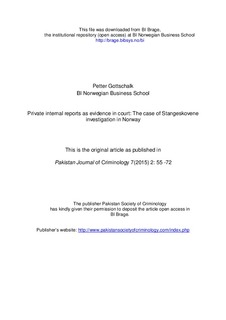| dc.contributor.author | Gottschalk, Petter | |
| dc.date.accessioned | 2016-07-01T12:46:39Z | |
| dc.date.available | 2016-07-01T12:46:39Z | |
| dc.date.issued | 2015 | |
| dc.identifier.citation | Pakistan Journal of Criminology 7(2015) 2: 55 -72 | nb_NO |
| dc.identifier.issn | 2074-2738 | |
| dc.identifier.issn | 2222-6648 | |
| dc.identifier.uri | http://hdl.handle.net/11250/2395265 | |
| dc.description | This is the original article as published in Pakistan Journal of Criminology. The publisher Pakistan Society of Criminology has kindly given their permission to deposit the article open access in BI Brage | nb_NO |
| dc.description.abstract | Fraud examiners, financial crime specialists and counter fraud specialists
are in the business of private internal investigations for their clients. In the
case of Stangeskovene in Norway a verdict from Oslo District Court dated
December 16, 2014, says that “investigators‟ judgments have limited
evidentiary value”, and that the court has noted “three fundamental flaws in
the investigation report”. While investigators nicely concluded that “the
company disclosure scheme is practiced illegally” and that the investigation
has “revealed violations of the Shares Act”, Oslo District Court found no
violations of laws in their three rulings from November and December in
2014. On the contrary, plaintiffs lost on all accounts as they tried to push
the investigation report in front of them as evidence in the cases concerning
shares in Stangeskovene. | nb_NO |
| dc.language.iso | eng | nb_NO |
| dc.publisher | Pakistan Society of Criminology | nb_NO |
| dc.title | Private internal reports as evidence in court: The case of Stangeskovene investigation in Norway | nb_NO |
| dc.type | Journal article | nb_NO |
| dc.type | Peer reviewed | nb_NO |
| dc.source.journal | Pakistan Journal of Criminology | nb_NO |
| dc.description.localcode | 1, Forlagsversjon | nb_NO |
